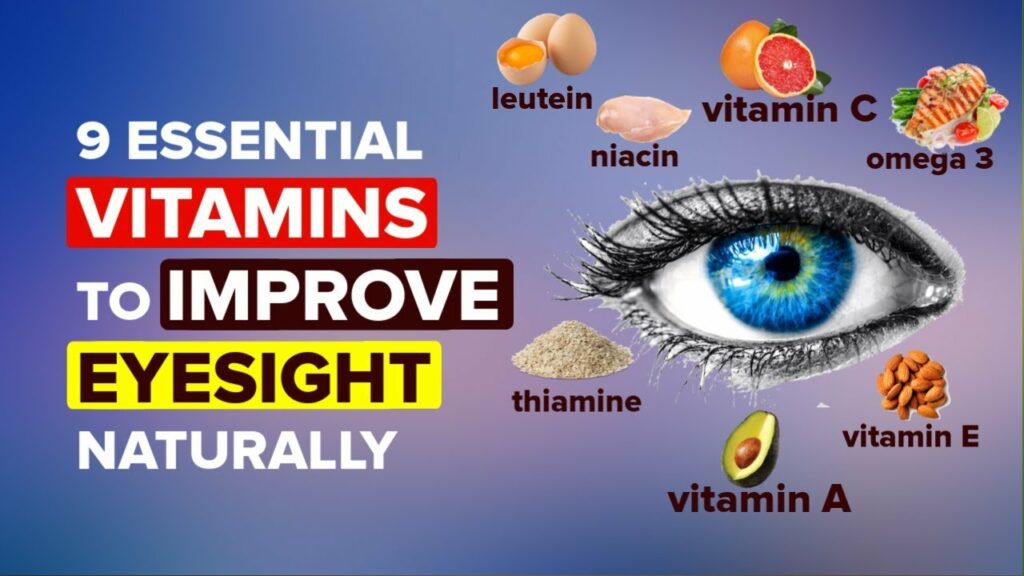Vitamin A
Importance
Vitamin A is critical for maintaining healthy vision. It is a component of rhodopsin, a protein in the eyes that allows you to see in low light conditions. Deficiency can lead to night blindness and more severe eye conditions like xerophthalmia, which can damage the cornea and lead to blindness.
Sources
Vitamin A can be found in two primary forms: retinol (from animal sources like dairy products, fish, and meat, especially liver) and beta-carotene (from plant sources like carrots, sweet potatoes, and spinach), which the body converts into vitamin A.
Vitamin C
Importance
Vitamin C is an antioxidant that protects the eyes against damaging free radicals. It is found in high concentrations in the eye’s fluid, known as the aqueous humor, and studies suggest that vitamin C may help prevent or delay cataracts and support the health of the retinal blood vessels.
Sources
Citrus fruits (like oranges and grapefruits), bell peppers, strawberries, and broccoli are excellent sources of vitamin C.
Vitamin E
Importance
Like vitamin C, vitamin E is a powerful antioxidant that helps protect the eyes from oxidative stress, which can degrade healthy tissues. This vitamin is particularly important in decreasing the risk of age-related macular degeneration (AMD) and cataracts.
Sources
Nuts and seeds, such as almonds and sunflower seeds, are among the best sources of vitamin E. Green leafy vegetables and fortified cereals also contain this vitamin.
Zinc
Importance
Zinc is a trace mineral essential for the body and plays a vital role in transporting vitamin A from the liver to the retina, to produce melanin, a protective pigment in the eyes. Zinc deficiency has been linked to impaired vision, and night vision problems.
Sources
Beef, poultry, seafood (especially oysters), and pumpkin seeds are excellent sources of zinc.
Lutein and Zeaxanthin
Importance
Lutein and zeaxanthin are carotenoids found in the retina and are known as the “eye vitamins.” They filter harmful high-energy blue wavelengths of light and help protect and maintain healthy cells in the eyes. The consumption of these nutrients is associated with a decreased risk of chronic eye diseases, including AMD and cataracts.
Sources
Green leafy vegetables like spinach, kale, and collards are rich in both lutein and zeaxanthin. Peas, eggs, and corn also provide these nutrients.
Omega-3 Fatty Acids
Importance
Omega-3 fatty acids (especially DHA and EPA) are crucial for retinal function and visual development. These fats are integral to the structural component of cell membranes and can help reduce the risk of dry eyes and AMD.
Sources
Flaxseeds, chia seeds, walnuts, and oily fish such as salmon, sardines, and mackerel are high in omega-3 fatty acids.
B Vitamins
Importance
Several B vitamins, including vitamin B6, B9 (folate), and B12, play a role in reducing homocysteine levels in the blood, which is associated with vascular problems affecting the retina. B vitamins can help manage the risk of AMD and may support the overall health of the eyes.
Sources
Whole grains, eggs, dairy products, and meat provide various B vitamins. Leafy green vegetables and legumes are good sources of folate.
Selenium
Importance
Selenium is a mineral with antioxidant properties that works closely with vitamin E to help prevent oxidative stress in the body, including the eyes. This mineral helps support the immune system, which can help prevent infections and diseases in the eye.
Sources
Brazil nuts are one of the highest natural sources of selenium. Fish, meat, eggs, and whole grains also provide selenium.
Copper
Importance
Copper works together with zinc and helps form a key antioxidant enzyme called superoxide dismutase, which helps protect the eyes against damage. Copper deficiency can lead to vision loss.
Sources
Shellfish, whole grains, nuts, seeds, and organ meats are good sources of copper.
FAQs About Vitamins for Eye Health
Can taking these vitamins prevent or cure eye diseases?
While these vitamins are essential for maintaining eye health and may reduce the risk of certain eye diseases, they are not a cure-all. Regular eye check-ups and a balanced diet, combined with a healthy lifestyle, are critical for eye health.
Are there any risks associated with taking supplements for eye health?
Yes, taking excessive amounts of vitamins, especially in supplement form, can be harmful. It’s best to aim to get these vitamins from a balanced diet. However, if you choose to take supplements, it should be under the guidance of a healthcare provider.
What is the recommended daily intake of these vitamins for optimal eye health?
The recommended daily intake varies based on age, gender, and health conditions. It’s best to consult with a healthcare provider or nutritionist to understand your specific needs.
Can lifestyle changes improve eye health along with these vitamins?
Absolutely. Quitting smoking, wearing sunglasses, using protective eyewear, and avoiding excessive screen time can also help maintain eye health.
How long does it take for changes in diet to affect eye health?
Improvements from dietary changes can take several months to manifest in eye health. Consistency is key.
Are there any foods that should be avoided for good eye health?
Diets high in saturated fats and sugars can have a negative impact on eye health. Reducing these can be beneficial.
Is it necessary to take all these vitamins to support eye health?
Not necessarily; a well-rounded diet that includes a variety of nutrients is typically sufficient to support eye health. However, some individuals may require supplements due to dietary restrictions or underlying health conditions.
.
- How To Use CBD Cream For Anxiety Relief And Stress Management - May 22, 2025
- Xela Rederm Skin Booster Treatments Near Brooklands, Surrey - May 22, 2025
- What Makes Vista Edge Vape Stand Out In The Premium Vape Market? - May 21, 2025

